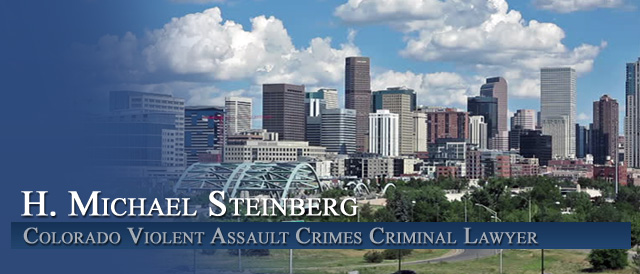





 Colorado Criminal Law – The Law Of “Fresh Pursuit” – Can The Police Chase You Into Another County Or State?
Colorado Criminal Law – The Law Of “Fresh Pursuit” – Can The Police Chase You Into Another County Or State?
By H. Michael Steinberg Colorado Assault And Violent Crimes Criminal Defense Lawyer – Attorney
Colorado Criminal Law – The Law Of “Fresh Pursuit” – Can The Police Chase You Into Another County Or State? – The authority of the police to cross jurisdictional boundaries such as county lines can be confusing to many who are prosecuted for Colorado crimes. This article addresses that issue. Simply put – can the police follow you if they are in “fresh pursuit?”
Fresh Pursuit Across State Lines Into Colorado
“Fresh pursuit” means the pursuit without unnecessary delay of a person who has committed a crime or who is reasonably believed to have committed a crime.
Fresh pursuit means the police are chasing a suspect and have had continuous contact with that suspect of a crime. The doctrine of fresh pursuit is governed by several different laws – statutes – in Colorado.
The primary law is Colorado Revised Statute (C.R.S.) Section 16-3-104, which reads as follows:
Colorado Revised Statutes Title 16 Criminal Proceedings § 16-3-104 Arrest by Peace Officer From Another Jurisdiction – Definitions
(1) As used in this section:
(a) “State” means any state of the United States and the District of Columbia;
(b) “Peace officer” means any officer of another state having powers of arrest in that state;
(c) “Fresh pursuit” means the pursuit without unnecessary delay of a person who has committed a crime or who is reasonably believed to have committed a crime.
(2) Any peace officer of another state who enters this state in fresh pursuit and continues within this state in fresh pursuit of a person in order to arrest him on the ground that he has committed a crime in the other state has the same authority to arrest and hold such person in custody as a peace officer of this state has to arrest and hold a person in custody.
(3) Except as otherwise provided by law, if an arrest is made in this state by a peace officer of another state in accordance with the provisions of this section, he shall without unnecessary delay take the person arrested before the nearest available judge of a court of record. Such judge shall conduct a hearing for the purpose of determining the lawfulness of the arrest. If the judge determines that the arrest was lawful, he shall commit the person arrested to await the time provided by law for issuance of an extradition warrant by the governor of this state, or the waiver thereof, and shall set bail if the offense is bailable under the laws of the state of Colorado. If the judge determines that the arrest was unlawful, he shall order the discharge of the person arrested.
Subsection (2) of Section 16-10-103 specifically authorizes fresh pursuit and provides legal authority of the police officer of another state in the chase across state lines in pursuit of their suspect granting “the same authority to arrest and hold such person in custody as a peace officer of this state has to arrest and hold a person in custody.”
Fresh Pursuit Intra State – Across County Lines Is Governed By C.R.S. Section 16-3-106
C.R.S. Section 16-3-106 provides:
When any peace officer is in fresh pursuit of any alleged offender, having a warrant for his arrest or having knowledge that such warrant has been issued, or, in the absence of an arrest warrant, when the offense was committed in the officer’s presence or the officer has reasonable grounds to believe that the alleged offender has committed a criminal offense, and the alleged offender crosses a boundary line marking the territorial limit of his authority, such peace officer may pursue him beyond such boundary line and make the arrest, issue a summons and complaint, or issue a notice of penalty assessment.
Broken down into it’s component parts the above law provides for arrests when in fresh pursuit IF:
1. The police officer has a warrant for arrest or is aware of said warrant;
2. In the absence of a warrant, the crime was committed in the officer’s presence or he as “reasonable grounds” to believe the alleged suspect has a committed a crime;
3. The suspect has committed a boundary line which territorial limit applies to the police officer in fresh pursuit;
If this showing can be made by the police officer- the law then allows that officer to:
(1) make an arrest,
(2) issue a summons and complaint, or
(3) issue a notice of penalty assessment ticket.
Understanding The Colorado “Territorial Limits” Law – C.R.S. Section 16-3-106
Implicit in C.R.S. Section 16-3-106 this is a clear prohibition prohibiting peace officers from going outside the territorial boundaries of their authority to arrest suspects unless as specifically provided in the limited circumstances described.
This law has been in existence in Colorado for a very long time. When it was enacted the Colorado State Legislature said that the law was intended to “….to limit peace officers from exercising their arrest powers and their law enforcement efforts, to the territorial limits of their authority and to require that local peace officers be advised and participate in the extraterritorial law enforcement activities of other peace officers.”
To repeat – and this is important – even if a police officer has a warrant for the arrest of a person, that Colorado police officer may not go outside the territorial boundaries of his authority to accomplish that arrest unless the officer is in fresh pursuit of the alleged offender.
What Happens If The Police Violate Their Territorial Limits – Q: Must The Court Suppress The Illegally Obtained Evidence?
The answer to the above question is complex. Essentially the answer is that where Section 16-3-106 has been violated by a Colorado peace officer, the evidence obtained as a result of that violation should be suppressed (not admitted at trial) if the violation also violates a constitutional right of the Defendant, such as the Fourth Amendment right to be free from unreasonable searches and seizures.
The application of the Fruit of the Poisonous Tree Doctrine – the Exclusionary Rule – is applicable should be applicable requires a clear infringement of constitutional rights of the arrested person “and cannot be predicated simply only on a violation of statutory limitations on the authority of peace officers, such as those limitations on extraterritorial authority of peace officers set forth in Section 16-3-106. “
Here is what the Colorado Appellate Courts have said about the exclusion of evidence for a constructional violation involving 16-3-106:
In cases where the police act in willful disobedience of the law, the courts have not hesitated to use their supervisory power to exclude evidence….
This Court cannot sanction willful and recurrent violations of the law, and thus, future violations of the statutes governing peace officers’ authority to arrest may trigger application of the exclusionary rule and require suppression of evidence obtained in the course of an extraterritorial arrest.
The Two Step Process To Find A Constitutional Violation of 16-3-106:
Before the Trial Court can suppress evidence for a violation of Section 16-3-106 the Court must apply the following two step process:
1. The Trial Court must find the If the police officer exceeded his statutory arrest authority,
2. The Trial Court must then determine whether the unauthorized arrest is unconstitutional and that illegality warrants the suppression of the illegally seized evidence.
If police officers exhibit a knowing disregard of the territorial boundaries of their authority, coupled with … failure to avail themselves of simple procedures readily available for legitimizing an extraterritorial arrest,” i.e., seeking the assistance of local peace officers, their actions may fall within the zone of constitutional unreasonableness under Article II, Section 7, of the Colorado Constitution.”
Salient principles that emerge from the foregoing decisions are that suppression is not foreclosed as a possible remedy for willful violations by police officers of section 16-3-106 and that such statutory violations in any event will trigger suppression if they are so egregious as to violate the protections against unreasonable searches and seizures guaranteed by our state constitution.
Clearly these cases are very fact specific. Courts review a Defendant’s allegation that police violated the extraterritorial limits of their power will be carefully weighed in determining whether suppression of evidence is appropriate under the facts of any specific case.
The Requirement That Police Acting Outside Their Territorial Jurisdiction Obtain The Assistance Of Local Police
It has long been recognized that police officers “policing” outside their territorial jurisdictions must obtain the aid of local officers who have authority to make arrests in the “foreign” jurisdiction, (unless the case falls under the doctrine of fresh pursuit).
An Example of the Application of the “Local Assistance” Rule:
In a case involving the Larimer County Sheriff’s office, the sherriff executed an arrest warrant on the Defendant at his residence in Weld County (Greeley, Colorado). To make the arrest – absent fresh pursuit, before making the arrest, Larimer County officers must requested and receive local assistance from officers of the Weld County Sheriff’s office and or the Greeley Police Department. If that procedure is followed, the arrest is lawful.
The “Local Assistance” Rule – Authority Outside the Jurisdiction of Police Department
The following statute sets out the requirement that an out of jurisdiction police office obtain the assistance of the local police department (see below Section 16-3-110 (2).
Authority of Peace Officer to Make an Arrest – § 16-3-110. Peace Officers – Duties
(1) For the purposes of this section, “peace officer” means:
(a) A peace officer as described in section 16-2.5-101; or
(b) A federal law enforcement officer who, pursuant to federal statutes and the policy of the agency by which the officer is employed, is authorized to use deadly physical force in the performance of his or her duties.
(2) A peace officer shall have the authority to act in any situation in which a felony or misdemeanor has been or is being committed in such officer’s presence, and such authority shall exist regardless of whether such officer is in the jurisdiction of the law enforcement agency that employs such officer or in some other jurisdiction within the state of Colorado or whether such officer was acting within the scope of such officer’s duties when he or she observed the commission of the crime, when such officer has been authorized by such agency to so act. The local law enforcement agency having jurisdiction shall be immediately notified of the arrest and any person arrested shall be released to the custody of the local law enforcement agency.
(3) This section shall not be construed to authorize any federal officer to use deadly physical force in excess of that authorized in section 18-1-707, C.R.S.
Summary And Conclusion – Colorado Criminal Law – The Law Of “Fresh Pursuit” – Can The Police Chase You Into Another County Or State?
The arrest authority of officers outside their jurisdiction includes:
(a) When a felony or misdemeanor is committed in the officer’s presence in another jurisdiction in the state of Colorado, the local law enforcement agency is notified of the arrest and the arrestee is transferred to that agency (CRS § 16-3-110).
(b) When the officer is in fresh pursuit from within the jurisdiction of a Colorado police officer and any of the following conditions exist (CRS § 16-3-106):
1. An arrest warrant has been issued for the person or the officer knows that such warrant has been issued for the person.
2. An offense was committed in the officer’s presence.
3. The officer has probable cause to believe that the person committed an offense.
(c) When officers are accompanied by law enforcement officers who have the authority to make an arrest in that jurisdiction, are present at the scene of the arrest and participate in the arrest process (CRS § 16-3-202).
Finally an officer making an arrest as outlined above must, as soon as practicable, after making the arrest, notify the agency having jurisdiction where the arrest was made (CRS § 16-3-110).
Colorado Criminal Law – The Law Of “Fresh Pursuit” – Can The Police Chase You Into Another County Or State?
If you found any of the information I have provided on this web page article helpful please click my Plus+1 or the Share buttons for Twitter and Facebook below so that others may also find it.
The contents of this article are based upon my research, my personal experience and my personal analysis and opinions developed from my thirty six years (as of 2018) of criminal trial experience from both sides of the courtroom – as a former career prosecutor for Arapahoe and Douglas Counties (13 years) and as the owner of my own Criminal Defense Law Firm since 1999 (19 years).
The reader is also admonished that Colorado criminal law, like criminal law in every state and at the Federal level, changes constantly. The article appearing above was accurate at the time it was drafted but it cannot account for changes occurring after it was uploaded.
If, after reading this article, you have questions about your case and would like to consider retaining our law firm, we invite you to contact us at the Steinberg Colorado Criminal Defense Law Firm – 303-627-7777.
Never stop fighting – never stop believing in yourself and your right to due process of law. You will not be alone in court, H. Michael will be at your side every step of the way – advocating for justice and the best possible result in your case. H. Michael Steinberg is passionate about criminal defense. His extensive knowledge and experience of Colorado Criminal Law gives him the edge you need to properly handle your case
 ABOUT THE AUTHOR: H. Michael Steinberg – Email The Author at:
ABOUT THE AUTHOR: H. Michael Steinberg – Email The Author at:
A Denver Colorado Criminal Defense Lawyer – or call his office at 303-627-7777 during business hours – or call his cell if you cannot wait and need his immediate assistance – please call 720-220-2277.
“A good criminal defense lawyer is someone who devotes themselves to their client’s case from beginning to end, always realizing that this case is the most important thing in that client’s life.”
You should be careful to make a responsible choice in selecting a Colorado Criminal Defense Lawyer. We encourage you to “vet” our firm. Over the last 36 plus years – by focusing ONLY on Colorado criminal law – H. Michael has had the necessary time to commit to the task of constantly updating himself on nearly every area of criminal law, to include Colorado criminal law and procedure and trial and courtroom practice.
Putting more than 36 years of Colorado criminal defense experience to work for you.
H. Michael works hard to get his clients the best possible results in and out of the courtroom. He has written, and continues to write, extensively on Colorado criminal law and he hopes this article helps you in some small way – Colorado Criminal Law – The Law Of “Fresh Pursuit” – Can The Police Chase You Into Another County Or State?

Other Articles of Interest:
- The Police Cannot Create Their Own Exigent (Emergency) Circumstance To Violate Your Rights In Colorado
- Attorney Profile
- Can I Obtain A Colorado Police Officer’s Records? – The Law
- Colorado Assaults On Police Officers – Dangerous Laws 18-3-203 & 18-3-204
- The Colorado Rules Of Criminal Procedure












